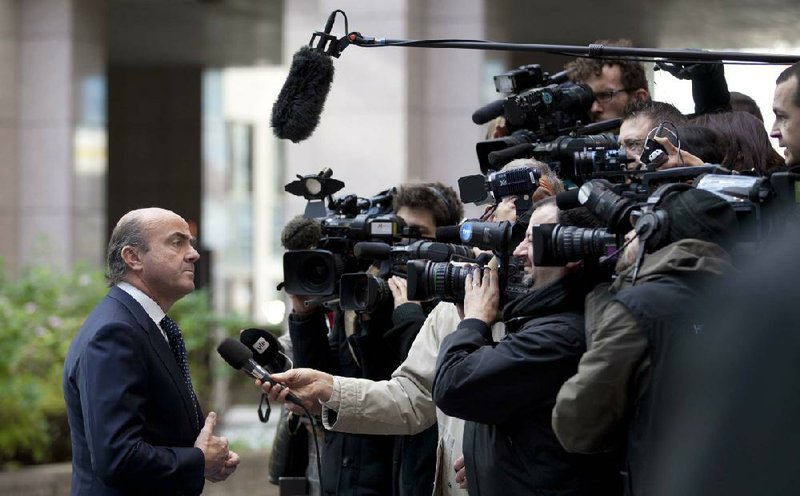BRUSSELS — After a marathon negotiation session, finance ministers from the 17 European Union countries that use the euro struck an agreement with the International Monetary Fund on a program to reduce Greek debt and put Athens on the way to get the next installment of its much-needed bailout loans.
The first disbursement is set to take place Dec. 13, said Jean-Claude Juncker, head of the euro group of finance ministers, after today’s agreement, under which Greece’s debt would be reduced to 124 percent of its gross domestic product by 2020.
“I very much welcome the decisions taken by the ministers of finance,” Mario Draghi, president of the European Central Bank, said after the meeting in Brussels. “They will certainly reduce the uncertainty and strengthen confidence in Europe and in Greece.”
The ministers had failed twice in the past two weeks to reach an agreement to release some $56.8 billion for the cash-strapped country. Greece had been living on borrowed time - it still owes money it was supposed to repay last week.
In Athens, Prime Minister Antonis Samaras welcomed the deal as a great victory. “As Greeks, we fought together. And tomorrow a new day begins for all Greeks.”
And the EU lauded all Greeks for holding their country back from the brink.
‘’We strongly believe in the Greek capacity to recover. The Greek people are courageous people. They are willing to bring their country back on the path of growth,” Juncker said.
The so-called troika of the European Central Bank, the IMF and the European Commission, which is the 27-country EU’s executive arm, has twice agreed to bail out Greece, pledging a total of about $311 billion in rescue loans - of which the country has received about $195 billion. In return for its bailout loans, Greece has had to impose several rounds of austerity measures and submit its economy to scrutiny.
Greece is predicted to enter its sixth year of recession shortly and has a quarter of its work force out of jobs. Without the bailout funds that have been keeping it afloat since May 2010, the country would have defaulted and could have ended up having to leave the eurozone. This could have had a domino effect on other financially troubled eurozone nations.
The main aim of the bailout program is to right Greece’s economy and get it to a point where it can independently raise money on the debt markets. It has been clear for months that the country is far from achieving that goal. The talks have centered on trying to get Greece back on the path to sustainability by reaching an agreement on how the country’s debt load can be reduced.
During the talks, which began Monday and lasted about 12 hours, the IMF pressed ministers to agree that Greece’s debt should be cut by about 20 percent of GDP through methods that include a debt buyback, lowering interest rates, lengthening the deadlines for debt repayments, and returning profits to Greece made on bonds bought by the European Central Bank.
In exchange, the IMF compromised by loosening its debt target to about 124 percent of Greece’s gross domestic product by the end of the decade. The fund had been insisting on a target of 120 percent by 2020.
Christine Lagarde, managing director of the IMF, emphasized at a news conference that agreement had also been reached to ensure that Greek debt was “substantially lower” than 110 percent of GDP by 2022.
Juncker said the agreement also includes a cut of 100 basis points on the interest rate charged to Greece by other eurozone member states - excluding those that are also receiving bailouts.
It also includes a 15-year extension of the maturities of loans from other countries and the eurozone’s bailout fund, the European Financial Stability Facility, and a deferral of interest payments by Greece on the bailout fund loans by 10 years.
“This is not just about money,” Juncker said. “It is the promise of a better future for the Greek people and for the euro area as a whole.”
Lagarde also said the agreement was significant.
“We wanted to make sure that Greece was back on track,” she said. “If you put it all together it is a significant amount.”
Greece will get about $40.84 billion straight away and the rest in separate installments in January, February and March.
The agreement will have to be submitted to national parliaments in some countries. After that, the finance ministers plan to hold another meeting, either in person or by telephone, to give final approval to the disbursement.
Information for this article was contributed by Don Melvin, Raf Casert, Pan Pylas, Geir Moulson and Derek Gatopoulos of The Associated Press and by James Kanter of The New York Times.
Front Section, Pages 1 on 11/27/2012

